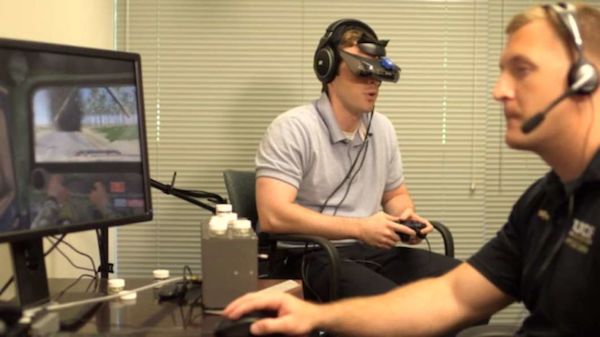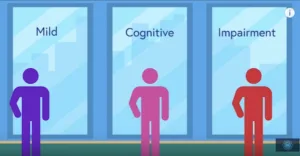Following my articles covering VR over the last few months, I have addressed many areas within the virtual reality field from technological status, marketing success or lack thereof, sociological affects, potential applications (consumer, military, industrial, business, etc.), to development goals. One thing that has often been addressed in a more generic way is the question what VR does to us, or more specifically what it does to our brain.

For a long time psychological / neurological science and display developers have more or less coexisted with little interaction between the two groups that should be working together very closely. One develops and sells devices that interact directly with our vision system and furthermore create brain activity within the viewers, while the other is trying to measure and describe exactly that brain activity. There are many reasons why there seems to be a disconnect between these two fields and I am not able to explain the reasons or change this situation.
However, whenever display engineers and scientists develop a new display technology or content, some time after market introduction we occasionally hear some news about what this device or content does to the consumer. Remember the discussion about video game or TV induced seizures? First there were rumors, than described cases and then some understanding what can lead to this kind of seizures. With that understanding today’s video games are much less likely to induce any kind of seizures in players.
Virtual reality today is in between rumors and described cases. While we know that VR sickness is a real thing, the reason for this is still under research. Yes, companies including Facebook / Oculus have a working understanding of this issue and realized technical solutions that minimize this issue. Does that mean we understand the underlying process in our brain leading to such an issue? I doubt it at this point in time.
 VR for PTSD Treatment; credit: CNBC
VR for PTSD Treatment; credit: CNBC
Here is an update on some reported research in this field.
“Can Virtual Reality Cause Brain Damage”, an article from HowToCreateApps.com discusses this topics and describes the following aspects that we are currently aware of:
- Damage in Brain’s GPS System
- VR Sickness
- Post-VR Sadness
- Dissociation Effect
The brain’s GPS system is not the smartphone, in case you wonder. It is a group of cells in the hippocampus that create a mental map of an environment. These ‘GPS’ cells are somewhat of a recent discovery and can be traced to a part of the brain that can be monitored. In an experiment by Mayank Mehta et.al. at the University of California they discovered that rats GPS cells responded differently depending if they perceived a room in reality or virtual reality. In an experiment, the rodents were searching for hidden rewards in a real maze as well as in a virtual reality maze. So to speak they trained the rats to play VR games. As it turns out, the rats were quite adept at finding the treasures in the real world as well as in the virtual reality maze. However, the neural activity in the hippocampus was quite different in the two different realities. In virtual reality, half of the neurons shut down and the rest of the neurons fired in a disordered fashion. Mayank Mahti explains this as ‘VR breaks the laws of physics’.
VR Sickness refers to the inconsistency of the sensory input between the different sensors of the human mind. We have quite a few sensors that tell us what is happening and we train our brain the whole life how these sensors perceive the same stimulus simultaneously. VR breaks this trained expectation by providing only one stimulus to the brain.This creates stress to our neurological network and as a consequence we do not feel well.
Post-VR sadness is more or less a rumor or single case. A designer named Tobias van Schneider experienced a strange mixture of sadness and disappointment after he left the VR world, describing various negative feelings that substantialize after the VR experience is over. There seem to be more of these cases describing similar experiences.
The Dissociation effect describes a similar experience where the users feel they are still in VR after they left the virtual reality. In other words the experience in the VR environment carries over to the real world influencing real life decisions in the real world. This effect was also confirmed in a study by Gunwoo Yen of the University of Illinois where they found that playing as a specific avatar led to a change in their real life behavior. Still think playing a game does not affect your real life?
As with many reports, negative effects pointed out by one study are opposed by positive affects pointed out by other researchers. In the case of VR we have many reports on how VR is helping people with psychological disorders. These reports are already in the stage of clinical experiments or even rollout to certain facilities.
For example in a video published by The Science Verse, the authors point out how VR is helping people with MCI (mild cognitive impairment) a condition that affects the persons cognitive abilities. In a study people using VR in a training sessions showed a significant increase in memory, balance and concentration. It is still not clear how VR affects the brains in these cases.
MCI Treatment; credit: The Science Verse
There is also the University of Central Florida developing a VR method to treat PTSD (post traumatic stress disorder) in military personnel as reported by CNBC. They received funds to roll out this system on a commercial basis to any person with some form of stress disorder.
There are many more reports on the surprising effects of VR on many forms of illnesses and pain management. We can certainly say that VR affects the brain function in unknown ways, ways that can be used for good or bad. Since we do not know what VR actually does to our brain, the outcome maybe surprising for all these early adopters. (NH)

